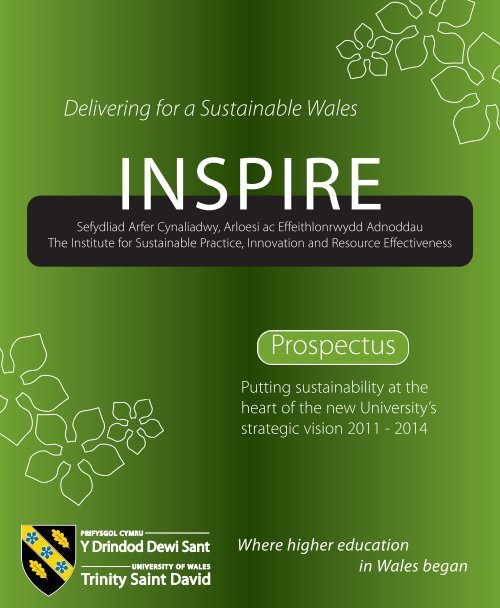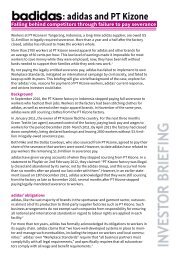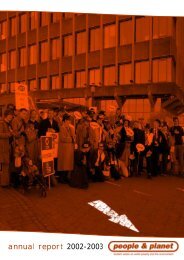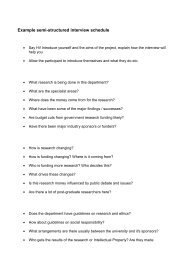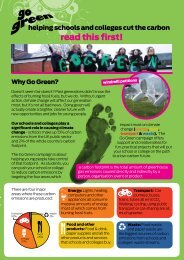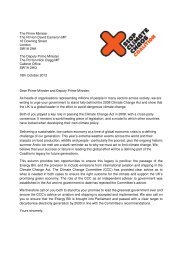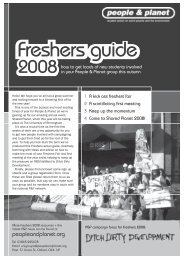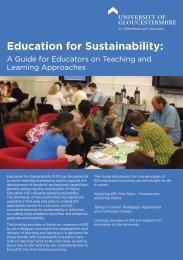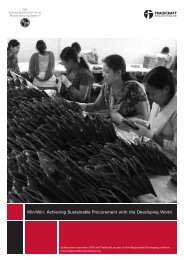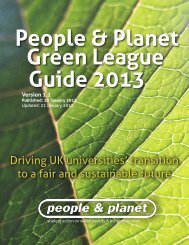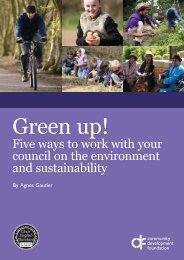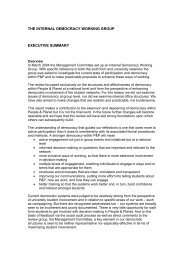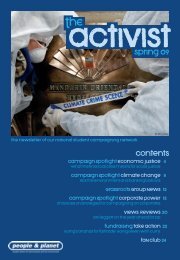INSPIRE Prospectus - University of Wales Trinity Saint David
INSPIRE Prospectus - University of Wales Trinity Saint David
INSPIRE Prospectus - University of Wales Trinity Saint David
You also want an ePaper? Increase the reach of your titles
YUMPU automatically turns print PDFs into web optimized ePapers that Google loves.
Delivering for a Sustainable <strong>Wales</strong><br />
<strong>INSPIRE</strong><br />
Sefydliad Arfer Cynaliadwy, Arloesi ac Effeithlonrwydd Adnoddau<br />
The Institute for Sustainable Practice, Innovation and Resource Effectiveness<br />
<strong>Prospectus</strong><br />
Putting sustainability at the<br />
heart <strong>of</strong> the new <strong>University</strong>’s<br />
strategic vision 2011 - 2014<br />
Where higher education<br />
in <strong>Wales</strong> began
<strong>INSPIRE</strong><br />
DELIVERING FOR A SUSTAINABLE WALES<br />
2 | www.tsd.ac.uk
DELIVERING FOR A SUSTAINABLE WALES<br />
<strong>INSPIRE</strong><br />
The <strong>University</strong> <strong>of</strong> <strong>Wales</strong> <strong>Trinity</strong> <strong>Saint</strong> <strong>David</strong> is…<br />
• “aiming to deliver for a sustainable <strong>Wales</strong>”<br />
locally, regionally, nationally and internationally<br />
and<br />
• “aiming to be the <strong>University</strong> <strong>of</strong> choice for<br />
discerning students and staff <strong>of</strong> the future”<br />
Contents<br />
1. Introduction<br />
2. <strong>University</strong> <strong>of</strong> <strong>Wales</strong> <strong>Trinity</strong> <strong>Saint</strong> <strong>David</strong> context<br />
3. Vision: sustainability, employability, internationalisation, culture and lifelong<br />
learning<br />
4. Governance<br />
5. Teaching and learning for sustainable development<br />
6. Living within our own environmental limits<br />
7. Engagement, advocacy and leadership<br />
www.tsd.ac.uk | 3
<strong>INSPIRE</strong><br />
DELIVERING FOR A SUSTAINABLE WALES<br />
1. Introduction<br />
The concept <strong>of</strong> sustainable development (SD) is fundamental in ensuring that our physical environment is in a good enough<br />
condition for human needs to be met. SD is increasingly being used as a philosophical framework and planning tool for<br />
better decision-making that can lead to the development <strong>of</strong> better services, creating more benefit with less resource. SD is<br />
about ensuring well-being and a better quality <strong>of</strong> life thinking about the impacts <strong>of</strong> today's actions on future generations<br />
and protecting and enhancing the natural environment by learning to live within our environmental limits.<br />
In 'Our Common Futures' 1987, the World Commission on the Environment and Development chaired by Dr Gro Harlem<br />
Brundtland, the Director General <strong>of</strong> the World Health Organisation, defined sustainable development as "development that<br />
meets the needs <strong>of</strong> the present without compromising the ability <strong>of</strong> future generations to meet their own needs”. This<br />
definition has been picked up worldwide, reflecting an increasing concern that actions are being taken across the globe<br />
which put this concept in peril. The idea <strong>of</strong> acting more sustainably has emerged in response to global concerns about social<br />
justice as well as the state <strong>of</strong> the planet. In particular, current concerns focus on the threat to human wellbeing presented by<br />
climate change at the same time as concerns remain about the integrity <strong>of</strong> ecosystems. Acting sustainably is about<br />
balancing social, environmental and economic needs in a way that does not compromise future generations.<br />
<strong>Wales</strong> has had a legislative commitment to have a sustainable development scheme since the establishment <strong>of</strong> the National<br />
Assembly for <strong>Wales</strong> in 1999. The Welsh Government has historically supported the UK Framework for Sustainable<br />
Development, which transposes the Brundtland definition into five key areas: living within environmental limits, ensuring a<br />
strong healthy and just society, achieving a sustainable economy, promoting good governance and using sound science<br />
responsibly. The Welsh Government itself uses five headline indicators to underpin its commitment to the UK Framework;<br />
economic output, social justice, biodiversity conservation, ecological footprint and wellbeing, each <strong>of</strong> which has a metric<br />
attached. A further 24 individual performance indicators under these headings are reported on annually.<br />
The Welsh Government's current scheme, 'One <strong>Wales</strong>, One Planet' published in 2009, is ambitious that <strong>Wales</strong> should be an<br />
exemplar in sustainable development. It recognizes that the ecological footprint <strong>of</strong> <strong>Wales</strong>, i.e. the relative scale <strong>of</strong> our<br />
consumption as a nation, is already three times more than that available to us, effectively meaning that we need three<br />
planets to sustain our use <strong>of</strong> resources. The government <strong>of</strong> the day proposed therefore that '<strong>Wales</strong> should become a one<br />
planet nation by putting sustainable development at the heart <strong>of</strong> government; creating a resilient and sustainable economy<br />
that lives within its environmental limits and only using our fair share <strong>of</strong> the earth's resources to maintain our lifestyles'<br />
Now, the Welsh Government has announced that it will legislate to ensure that Sustainable Development is not only the<br />
central organising principle <strong>of</strong> government, but also that <strong>of</strong> the public sector in <strong>Wales</strong>. This legislative commitment will be<br />
monitored externally by a new independent sustainable development body.<br />
In taking this agenda forward, <strong>Wales</strong> is following in the lead <strong>of</strong> successful global businesses, e.g. Unilever, Proctor and<br />
Gamble and on a UK level, Marks and Spencer's, Cooperative Stores Ltd and others, who recognize and state publicly that<br />
being sustainable for the longer term is good for business. Declining natural resources will increase in price so investing in<br />
the green economy or greening the economy makes both economic and social sense. Integrated reporting on sustainability<br />
is becoming the norm.<br />
A key challenge to a modern university is to create appropriate teaching and knowledge exchange programmes to ensure<br />
that the knowledge we develop meets policy and user needs within society, and to set an example in doing so. In addition,<br />
there is currently a pressing challenge to address a transition to a low carbon society within a rapid time scale.<br />
4 | www.tsd.ac.uk
DELIVERING FOR A SUSTAINABLE WALES<br />
<strong>INSPIRE</strong><br />
2. <strong>University</strong> <strong>of</strong> <strong>Wales</strong> <strong>Trinity</strong> <strong>Saint</strong> <strong>David</strong> context<br />
In 2010, following the merger between <strong>Trinity</strong> College and Lampeter <strong>University</strong>, the merged <strong>University</strong> <strong>of</strong> <strong>Wales</strong> <strong>Trinity</strong> <strong>Saint</strong><br />
<strong>David</strong> was successful in securing a place on the Higher Education Academy’s “Green Academy” programme. The Green<br />
Academy programme aims to support participating universities in embedding sustainable development throughout their<br />
operations. The programme was oversubscribed and <strong>Trinity</strong> <strong>Saint</strong> <strong>David</strong> joined other successful institutions (Southampton,<br />
Worcester, Swansea, Nottingham, Canterbury, Keele and Bristol) to take this agenda forward. The Green Academy ‘Fit for the<br />
Future’ framework outlined below aims to embed SD through the curriculum, campus, community and culture <strong>of</strong> the<br />
university including research and innovation, governance and key performance indicators:<br />
• The development <strong>of</strong> curriculum-related delivery to ensure students at the <strong>University</strong> and its partner institutions are provided with<br />
the knowledge, skills and attitudes that will equip them for their future contribution to the economy, community and environment<br />
• The development <strong>of</strong> a campus that reflects the highest standards <strong>of</strong> environmental performance and contributes to the<br />
social and economic capacity <strong>of</strong> the <strong>University</strong> and the wider community<br />
• The contribution to the community in which the <strong>University</strong> operates, with special regard to the issues <strong>of</strong> sustainable rural<br />
communities and the development <strong>of</strong> south west <strong>Wales</strong> as a low carbon region<br />
• The development <strong>of</strong> a research and innovation capacity focused on core strengths <strong>of</strong> the <strong>University</strong>, related to the<br />
organisational objectives and linked to a strong network <strong>of</strong> external partners<br />
• The integration <strong>of</strong> sustainable development within the governance structure, operating systems and key performance<br />
indicators <strong>of</strong> the <strong>University</strong>. An important objective is to ensure that this approach underpins the financial viability <strong>of</strong> the<br />
institution in reducing operating costs, improving the attractiveness <strong>of</strong> the <strong>University</strong> to potential students, and increasing<br />
the capacity to attract external investment.<br />
Each university participating in the Green Academy was encouraged to have a big idea about embedding sustainability in the<br />
institution. In February 2011, <strong>Trinity</strong> <strong>Saint</strong> <strong>David</strong> announced that the new university was ambitious to lead the Welsh agenda on<br />
sustainability and was seeking expressions <strong>of</strong> interest to develop a new <strong>Wales</strong> Institute for Sustainability focused on action and<br />
research to drive social, environmental and economic outcomes. The university called for proposals to:<br />
- support the development <strong>of</strong> the area as a low carbon region,<br />
- develop specific sustainability practice in a rural setting<br />
- develop cross-society exemplars <strong>of</strong> sustainability in practice<br />
- influence the practice <strong>of</strong> the current and new institution<br />
- support development <strong>of</strong> the ESDGC agenda in <strong>Wales</strong><br />
- develop partnerships with other organisations/institutions with a similar agenda<br />
Some 50 expressions <strong>of</strong> interest were received and in March, the bid from Jane <strong>David</strong>son supported by Peter Davies and Andy<br />
Middleton to take this agenda forward was agreed. (Jane <strong>David</strong>son was previously the Minister responsible for Sustainability<br />
in <strong>Wales</strong>, Peter Davies is the current Commissioner for Sustainable Futures in <strong>Wales</strong>, Andy Middleton is the Managing Director<br />
<strong>of</strong> TYF, a sustainability, education and adventure company based in St <strong>David</strong>’s).<br />
The impact <strong>of</strong> the Green Academy programme on the participating universities is being evaluated by an external team in 2012<br />
to provide the higher education sector with objective evidence <strong>of</strong> how effective change can take place in a university as well<br />
as <strong>of</strong>fering exemplars <strong>of</strong> effective practice in greening the HE curriculum. <strong>Trinity</strong> <strong>Saint</strong> <strong>David</strong> intends to lead the field as a result<br />
<strong>of</strong> taking its sustainability commitment forward across the whole university. As a result <strong>of</strong> the proposed merger between the<br />
<strong>University</strong> <strong>of</strong> <strong>Wales</strong> <strong>Trinity</strong> <strong>Saint</strong> <strong>David</strong>, Swansea Metropolitan <strong>University</strong> and the <strong>University</strong> <strong>of</strong> <strong>Wales</strong> from August 2012, the<br />
role <strong>of</strong> <strong>INSPIRE</strong>, the new Institute for Sustainable Practice, Innovation and Resource Effectiveness at <strong>Trinity</strong> <strong>Saint</strong> <strong>David</strong>, has<br />
been extended to work with all the component parts <strong>of</strong> the new institution.<br />
www.tsd.ac.uk | 5
<strong>INSPIRE</strong><br />
DELIVERING FOR A SUSTAINABLE WALES<br />
3. The vision<br />
Commitment:<br />
• The <strong>University</strong> <strong>of</strong> <strong>Wales</strong> <strong>Trinity</strong> <strong>Saint</strong> <strong>David</strong>, will provide a high quality, bilingual, educational experience for a diverse<br />
community <strong>of</strong> learners, contributing positively to the social, economic and environmental needs <strong>of</strong> <strong>Wales</strong>, locally,<br />
regionally, nationally and internationally.<br />
• Five key elements: sustainability, employability, internationalisation, culture and lifelong learning will underpin the unique<br />
university experience we <strong>of</strong>fer.<br />
• We will deliver our contribution by focusing on our teaching, research and knowledge exchange as well as how we<br />
conduct ourselves in delivering that mission.<br />
• Our core mission is 'delivering for a sustainable <strong>Wales</strong>, locally, regionally, nationally and internationally'<br />
The <strong>University</strong> <strong>of</strong> <strong>Wales</strong> <strong>Trinity</strong> <strong>Saint</strong> <strong>David</strong> has put sustainability at the heart <strong>of</strong> its new strategic plan as part <strong>of</strong> its journey <strong>of</strong><br />
transformational change; part <strong>of</strong> the new university's vision is "delivering for a sustainable <strong>Wales</strong> locally, regionally,<br />
nationally and internationally.”<br />
This is a tremendously exciting agenda. The <strong>University</strong> <strong>of</strong> <strong>Wales</strong> <strong>Trinity</strong> <strong>Saint</strong> <strong>David</strong> already has two campuses in Carmarthen<br />
and Lampeter as well as having over 1000 students in London. The new university, when fully transformed next year, will<br />
have two vibrant campuses in Swansea following the merger with Swansea Metropolitan <strong>University</strong>. The combination <strong>of</strong> pre<br />
and post 1992 institutions will give it both traditional REF research capability as well as more applied research capability. It<br />
will host the largest teacher education and training centre in <strong>Wales</strong>. It will have faculties covering all the disciplines and truly<br />
be a 21st century institution with a 21st century agenda.<br />
<strong>Trinity</strong> <strong>Saint</strong> <strong>David</strong>’s radical vision <strong>of</strong> the creation <strong>of</strong> a dual sector university - a new regional educational group structure<br />
which will deliver transformational change in south west <strong>Wales</strong> - is laid out in ‘Transforming Education, Transforming Lives’.<br />
That statement <strong>of</strong> intent has already been signed by <strong>Trinity</strong> <strong>Saint</strong> <strong>David</strong>, Swansea Metropolitan <strong>University</strong>, Pembrokeshire<br />
College, Coleg Ceredigion and Coleg Sir Gar. The agreed unification with Swansea Metropolitan <strong>University</strong>, with its<br />
specialisms in engineering, design and resource management will <strong>of</strong>fer a far more holistic and multidisciplinary approach to<br />
learning. That partnership also <strong>of</strong>fers a new opportunity to bring further education provision in Swansea into this<br />
overarching dual sector approach.<br />
A key objective <strong>of</strong> the new collegiate university in conjunction with its HE and FE partners, will be to establish closer<br />
academic partnerships with potentially all HE courses being validated by the <strong>University</strong> <strong>of</strong> <strong>Wales</strong> <strong>Trinity</strong> <strong>Saint</strong> <strong>David</strong>. FE<br />
Principals will play a senior role in the strategic management <strong>of</strong> the university and be appointed as Provosts. A single FE/HE<br />
educational plan will be created thus ensuring meaningful progression opportunities and a regional planning framework for<br />
further joint innovation, knowledge transfer and research opportunities.<br />
This new arrangement brings with it unprecedented opportunities for the university to incorporate a whole span <strong>of</strong><br />
sustainability related provision and research encompassing ecology and the environment, resource management,<br />
education, the economics <strong>of</strong> consumption and production as well as technology, alternative energy and organizational and<br />
spiritual dimensions. Being at the beginning <strong>of</strong> this process creates potential to develop and pilot innovative practices<br />
across the education spectrum, from initial teacher training through HE and FE to adult learning and schools, as well as via<br />
research and business and community engagement<br />
6 | www.tsd.ac.uk
DELIVERING FOR A SUSTAINABLE WALES<br />
<strong>INSPIRE</strong><br />
There is substantial public support for the sustainability agenda. In a general population poll undertaken by IPSOS Mori in<br />
November 2011, 64% thought the needs <strong>of</strong> future generations were more important than the needs <strong>of</strong> any particular<br />
generation such as their own or their children’s. 46% (the largest group) indicated that a healthy planet is the most<br />
important legacy to hand on to future generations; 67% thought the UK Government has failed to consider future<br />
generations enough in the decisions it makes today.<br />
In relation to students, work undertaken by the HEA and the NUS to look at attitudes <strong>of</strong> first year students towards<br />
sustainability demonstrates unequivocally that the students <strong>of</strong> today would like to see their institutions take this agenda<br />
forward. The importance <strong>of</strong> the student-led People and Planet ‘Green League’ has been growing each year. Rikki Miller, TSD<br />
Student President, wrote a message for students considering university choices for 2012, “In my view, if you care about<br />
sustainability issues, there’s only one country to go to - <strong>Wales</strong>, and within <strong>Wales</strong>, only one university to go to, <strong>University</strong> <strong>of</strong><br />
<strong>Wales</strong> <strong>Trinity</strong> <strong>Saint</strong> <strong>David</strong>.”<br />
The new university has a clear strategic message to differentiate itself. Five key elements underpin the university’s<br />
aspirations for the students <strong>of</strong> the future<br />
- sustainability<br />
- employability<br />
- internationalization<br />
- culture<br />
- lifelong learning<br />
These elements reflect a differentiated <strong>of</strong>fer; the student experience at the <strong>University</strong> <strong>of</strong> <strong>Wales</strong> <strong>Trinity</strong> <strong>Saint</strong> <strong>David</strong> post<br />
October 2013 will deliver an understanding <strong>of</strong> the sustainability agenda in a country committed to this and enhance the<br />
employability <strong>of</strong> individual students. Sustainability and employability will underpin the opportunities <strong>of</strong>fered overseas and<br />
through distance learning alternatives and the <strong>Trinity</strong> <strong>Saint</strong> <strong>David</strong> experience will be underpinned by a fundamental belief in<br />
the importance <strong>of</strong> culture, both in the recognition that a change <strong>of</strong> culture will be needed to challenge ingrained<br />
assumptions and practices as well as the strong cultural commitment to <strong>Wales</strong> and bilingualism. All <strong>of</strong> this will be predicated<br />
on a culture <strong>of</strong> lifelong learning and demonstrate how a confederal university structure can provide progression routes at all<br />
levels <strong>of</strong> people's lives through explicit relations with schools and colleges.<br />
www.tsd.ac.uk | 7
<strong>INSPIRE</strong><br />
DELIVERING FOR A SUSTAINABLE WALES<br />
4. Governance<br />
Commitment<br />
• The Governance arrangements for the university will reflect <strong>Trinity</strong> <strong>Saint</strong> <strong>David</strong>’s clear commitment to sustainable<br />
development.<br />
• The <strong>University</strong>’s Annual Report will include a Sustainability Statement<br />
• A <strong>University</strong>-wide Sustainable Development Group will be established following a staff skills audit<br />
• The <strong>University</strong> will become a signatory to the Welsh Government’s Sustainable Development Charter.<br />
The Governance arrangements for the university will reflect <strong>Trinity</strong> <strong>Saint</strong> <strong>David</strong>’s clear commitment to sustainable<br />
development in the new charter, strategic vision and the strategic priorities <strong>of</strong> the institution as well as within the<br />
university's core values and core strategic vision. Leadership and responsibility for sustainable development will be<br />
incorporated into the responsibilities <strong>of</strong> both the Chair <strong>of</strong> Council and the Vice-Chancellor. This provides a clear signal <strong>of</strong><br />
academic and operational leadership for this area and the importance <strong>of</strong> sustainable development to the university. A<br />
Pro Vice-Chancellor with a responsibility for delivering on the key strategic messages <strong>of</strong> the new university, including<br />
Sustainable Development, will be appointed to fully integrate sustainable development into all aspects <strong>of</strong> the new<br />
university’s role including resourcing, job description development, roles/responsibilities and performance reporting.<br />
The commitment at executive level is being matched by commitment through the governing body/university<br />
committee structures. This commitment will also be made public through signing the Welsh Government's Sustainable<br />
Development Charter.<br />
Universities in <strong>Wales</strong> have already signed ‘A university leader’s statement <strong>of</strong> intent on sustainable development’. This<br />
Statement outlines how universities plan to meet the challenges <strong>of</strong> sustainable development through<br />
• Demonstrating strong and visible senior management leadership for sustainability<br />
• Committing to the embedding <strong>of</strong> sustainable development into the institution's strategies<br />
• Developing active links with partner organisations, external networks, business and international organisations to share<br />
ideas and new approaches to sustainable development<br />
• Identifying clearly defined and institutionally appropriate sustainable development objectives and targets that are linked<br />
to sector and national targets<br />
• Publishing an institutional carbon management plan including a target for carbon reduction from energy consumption<br />
against a 2005 baseline. By doing so the institution will contribute to achieving the sector target <strong>of</strong> reductions in<br />
emissions <strong>of</strong> 34% by 2020 and 80% by 2050 against a 1990 baseline<br />
• Engaging staff and students to provide their ideas on how universities can help meet the challenges <strong>of</strong> sustainable<br />
development<br />
Once the clear lead from the top <strong>of</strong> the university has been established, a cross-cutting Sustainable Development Group<br />
(SDG) will be established to guide sustainable development strategies and actions within the <strong>University</strong>. This group will<br />
provide the link between those responsible for governance <strong>of</strong> the <strong>University</strong> and the operationalisation <strong>of</strong> the sustainable<br />
development vision. Membership <strong>of</strong> the Group will include representatives from each School and Institute; representatives<br />
from the student community on each campus; a representative <strong>of</strong> the <strong>University</strong> Council and external community<br />
representatives who link the work <strong>of</strong> the Sustainable Development Group to external stakeholders (such as local and<br />
national government).<br />
8 | www.tsd.ac.uk
DELIVERING FOR A SUSTAINABLE WALES<br />
<strong>INSPIRE</strong><br />
In the longer term, the Sustainable Development Group will advise on the following processes:<br />
- Capacity building at an institutional level to ensure sustainable development principles are being applied appropriately<br />
- Engaging with <strong>University</strong> committees<br />
- Engaging with Human Resources to ensure all job descriptions, roles and responsibilities and performance evaluation<br />
processes include sustainable development responsibilities where appropriate<br />
- Working in partnership with Institutes and Units within the <strong>University</strong> to ensure sustainable development strategy<br />
priorities are reflected in their activities.<br />
- Identifying funding opportunities from Research Councils and others to develop an effective academic cluster<br />
- Advising on curriculum <strong>of</strong>ferings and programme design<br />
The proposed merger between the <strong>University</strong> <strong>of</strong> <strong>Wales</strong> <strong>Trinity</strong> <strong>Saint</strong> <strong>David</strong>, Swansea Metropolitan <strong>University</strong> and the<br />
<strong>University</strong> <strong>of</strong> <strong>Wales</strong> is due to take place in August 2012. Following that merger, the new governing body will develop the<br />
appropriate governance structures to take forward the sustainability agenda.<br />
www.tsd.ac.uk | 9
<strong>INSPIRE</strong><br />
DELIVERING FOR A SUSTAINABLE WALES<br />
5. Teaching and Learning for sustainable<br />
development<br />
Commitment:<br />
• The university recognises the importance <strong>of</strong> developing sustainability literate graduates; it commits to engaging all<br />
students with sustainability concepts and issues in an appropriate context through learning and enhancing their<br />
employability.<br />
• The <strong>University</strong> will develop a suite <strong>of</strong> sustainable development related degree programmes that build on the new<br />
distinctive pr<strong>of</strong>ile <strong>of</strong> the university. Each faculty will <strong>of</strong>fer one new undergraduate and one new postgraduate course for<br />
the 2013 student intake<br />
• The <strong>University</strong> will embed sustainability into 15% <strong>of</strong> all students’ experiences by autumn 2013 creating a distinctive <strong>Trinity</strong><br />
<strong>Saint</strong> <strong>David</strong> ‘One Planet Curriculum’<br />
• The <strong>University</strong> will develop a unique 10 credit sustainability ‘One Planet Skills Passport’ including a Social Enterprise<br />
component for the 2014 intake, to be piloted in 2013 both within the <strong>University</strong> and through schools and college<br />
partnerships.<br />
From its inception, the new university has pledged to deliver a radical new model for the planning and delivery <strong>of</strong> education<br />
to serve the educational, social, cultural and economic needs <strong>of</strong> the region. The Regional Learning Partnership and the<br />
development <strong>of</strong> the dual sector university <strong>of</strong>fer a range <strong>of</strong> meaningful education pathways and progression routes which<br />
will enhance choices for a diverse cohort <strong>of</strong> students, provided the opportunities are underpinned by clear strategic<br />
messages.<br />
There are a number <strong>of</strong> overarching strategies that guide the <strong>University</strong>’s strategy with respect to teaching and learning. All<br />
disciplines have a contribution to make to the sustainability agenda, but also, sustainability, with its many inter-related<br />
strands (aesthetic, cultural, ecological, economic, environmental, social ethical, philosophical, political, scientific, spiritual<br />
and technological) is inter-disciplinary. The learning <strong>of</strong> undergraduate and postgraduate students can therefore be enriched<br />
by exposure to perspectives and insights from other disciplines and inter-disciplinary dialogue.<br />
There are potentially four layers <strong>of</strong> sustainable development education in the <strong>University</strong>:<br />
(1) specific degree/module provision (at under and post graduate level) and<br />
(2) sustainable development education embedded within discipline specific degree programmes<br />
(3) specific accredited courses to contribute to pr<strong>of</strong>essional development frameworks and skills acquisition e.g with public<br />
sector/businesses/voluntary sector<br />
(4) partnership with schools and colleges<br />
Wherever possible, these layers will be interwoven with action learning centred on real, pressing sustainability issues facing<br />
the communities and employers in south west <strong>Wales</strong>.<br />
10 | www.tsd.ac.uk
DELIVERING FOR A SUSTAINABLE WALES<br />
<strong>INSPIRE</strong><br />
Existing courses and modules are currently being revalidated following the merger between <strong>Trinity</strong> College and Lampeter<br />
<strong>University</strong>. By autumn 2013 each faculty aims to develop a new course with a major sustainability component. To take<br />
forward the embedding agenda initially, 20 credits in each year (UG & PG) will be utilised to reflect this commitment, so that<br />
the distinctive curriculum <strong>of</strong>fer at <strong>University</strong> <strong>of</strong> <strong>Wales</strong>, <strong>Trinity</strong> <strong>Saint</strong> <strong>David</strong> by the autumn 2013 intake will be 15% <strong>of</strong> the total<br />
student experience being delivered through a sustainability lens - a distinctive <strong>Trinity</strong> <strong>Saint</strong> <strong>David</strong> 'One Planet' curriculum.<br />
This will be a unique <strong>of</strong>fer.<br />
There is also a major opportunity for the university to develop a suite <strong>of</strong> accredited courses to assist the public sector and<br />
others to understand what sustainable development applied to decision making looks like, and also to specifically develop a<br />
10 credit skills passport which can be made available at level 4 upwards. This could be a prelude to a 'One Planet Skills<br />
Passport' sustainability core curriculum module taken by all students in the post 2014 intake which includes a work<br />
placement in a social enterprise. As the focus would be specifically on employability, such a model could then be <strong>of</strong>fered<br />
also by the university to distance learning students and developed alongside pr<strong>of</strong>essional practice frameworks to develop<br />
awards at post pr<strong>of</strong>essional level. This would have significant marketing appeal at a time when there is an emphasis on the<br />
benefits <strong>of</strong> social enterprises and employability more widely. Students will benefit from being able to enhance their CVs with<br />
work experiences, particularly when employment opportunities for young people are shrinking. A social enterprise<br />
experience for all students could give them the edge over others.<br />
In view <strong>of</strong> the Welsh Government's commitment to have legislated on sustainable development as the central organising<br />
principle <strong>of</strong> government by 2014, there are particular opportunities for the <strong>University</strong> <strong>of</strong> <strong>Wales</strong> <strong>Trinity</strong> <strong>Saint</strong> <strong>David</strong> to lead the<br />
way in creating new courses either on our own or in partnership with others to enhance understanding <strong>of</strong> the sustainability<br />
agenda in the public sector.<br />
There are many opportunities to take this agenda forward through <strong>Trinity</strong> <strong>Saint</strong> <strong>David</strong>'s <strong>University</strong>'s innovative, sector<br />
leading Going for Gold/AUR - the Associate Faculty <strong>of</strong> the <strong>University</strong>- which provides bilingual opportunities for secondary<br />
school pupils across South and Mid <strong>Wales</strong> to study at university level. Over 30 secondary schools participate currently in the<br />
scheme which has benefited 800 pupils since its launch. The scheme is a clear demonstrates <strong>of</strong> TSD's commitment to<br />
widening access to higher education and to Welsh medium higher education in particular.<br />
The modules <strong>of</strong>fered include study skills, curriculum based studies that contribute to the Welsh Baccalaureate as well as<br />
other courses related to the A Level curriculum. Amongst the many benefits to pupils is the opportunity to develop<br />
transferable skills that they will need at their choice <strong>of</strong> university as well as the opportunity to develop their knowledge and<br />
understanding <strong>of</strong> their chosen subjects.<br />
The accredited Level 4 Modules support pupils as they develop their communication skills, their learning and study skills<br />
and their analytical skills. Developing a distinctive 'One Planet' sustainability TSD curriculum will also be piloted through the<br />
'Going for Gold/Aur' programme.<br />
www.tsd.ac.uk | 11
<strong>INSPIRE</strong><br />
DELIVERING FOR A SUSTAINABLE WALES<br />
6. Living within our own environmental limits<br />
Commitment:<br />
• The <strong>University</strong> commits to practices that minimise the possibility <strong>of</strong> negative environmental, economic and social impacts;<br />
seeks to improve the environmental performance <strong>of</strong> the learning environment, to meet and where possible exceed<br />
national and international guidelines for sustainability; to achieve eco-branding <strong>of</strong> its facilities; to enhancing the<br />
ecological integrity <strong>of</strong> its campus landscape; to report annually on its achievements and to reward students who embrace<br />
this agenda and are prepared to be active in participation and monitoring.<br />
• The <strong>University</strong> will measure the environmental impact <strong>of</strong> each campus and draw up an annual report to improve<br />
performance<br />
• The <strong>University</strong> will publish a clear action plan on how it intends to live within its environmental limits in 2012<br />
• The <strong>University</strong> commits to achieving Green Dragon Level 5 on all its campuses and achieving a first class rating in the<br />
People and Planet Green League by 2013<br />
• The <strong>University</strong> will make opportunities available for students to win bursaries /scholarships if they make a 'One Planet<br />
Living' commitment when they come to the <strong>University</strong><br />
Universities seeking to take forward this agenda must demonstrate continuous improvement to be publicly recognised.<br />
Decisions taken in accordance with environmental management schemes <strong>of</strong>ten lead to reduced costs in the future if a life<br />
cycle analysis <strong>of</strong> the decisions is undertaken and improved staff and student relations. <strong>Trinity</strong> <strong>Saint</strong> <strong>David</strong>'s environmental<br />
framework will be based on good governance; addressing specific significant environment impacts i.e. energy use and<br />
generation; waste; water; transport and travel; focusing on the impacts <strong>of</strong> our core business <strong>of</strong> teaching and research and<br />
engagement with all members <strong>of</strong> our <strong>University</strong> community and wider stakeholders. A clear understanding about <strong>Trinity</strong><br />
<strong>Saint</strong> <strong>David</strong> <strong>University</strong>'s intentions to use sustainable transport, recycle waste on campus, eat locally sourced food, support<br />
fair-trade, save energy and save water will give students and others confidence that the <strong>University</strong> is serious about its<br />
commitments. Moving from the current achievement <strong>of</strong> Green Dragon Level 4 on the Carmarthen and Swansea campuses to<br />
Green Dragon Level 5 on all campuses and committing to achieve ISO 14001 because <strong>of</strong> its recognition outside <strong>Wales</strong> will be<br />
an important part <strong>of</strong> taking this agenda forwards.<br />
None <strong>of</strong> this agenda can be taken forward without the active participation <strong>of</strong> students. This requires a commitment to work<br />
together so that any new schemes introduced are managed successfully and as simply as possible. Recycling for example is<br />
well supported in other universities where the bin designation is very clear and recognisable (ie the bins are always in the<br />
same order) and where students are incentivised to monitor. Without clear intentions being communicated appropriately,<br />
there is a danger that at best, there is insufficient buy in to propositions to make environmental and energy changes, and at<br />
worst, active non-cooperation. All changes will be discussed with the students' union representatives prior to being<br />
introduced.<br />
As this is a new agenda, we intend to set up a reward scheme for students who come to us being prepared to make a 'One<br />
Planet Living' commitment' - a promise to be active on these issues during their university experience. With the support <strong>of</strong><br />
the Students' Union, we are reviewing the range <strong>of</strong> bursaries and internships managed by Student Services to create new<br />
opportunities to promote one planet living from September 2012. The Students' Union itself is actively participating in the<br />
NUS/EUAC Green Impact Awards.<br />
12 | www.tsd.ac.uk
DELIVERING FOR A SUSTAINABLE WALES<br />
<strong>INSPIRE</strong><br />
The university has been successful in coming from a no-score position to achieving a 2:2 in the People and Planet Green<br />
League last year. This is a particularly important league table as it is used regularly by students and staff when determining a<br />
university's environmental commitment. <strong>Trinity</strong> <strong>Saint</strong> <strong>David</strong>'s commitment to achieving Green Dragon Level 5 will<br />
automatically add 0.5 to our score. To achieve that, we will now need to publish a publicly available annual environmental<br />
report; designate internal auditors and put in place appropriate regular monitoring arrangements. As the Green League<br />
benchmarks universities, we will also need to demonstrate continuous improvement to hold our position.<br />
A critical element in the success <strong>of</strong> universities in the Green League is the extent <strong>of</strong> buy in across the university's senior<br />
management. This is much more than an estates issue. Substantial changes will need to be made across all aspects <strong>of</strong> the<br />
university environment. They will need to be planned and delivered over a specified timeframe taking a long term view <strong>of</strong><br />
financial, social and environmental costs when choosing between alternative options. Actions that will demonstrate the<br />
university's commitment are as follows:<br />
1. Environment Management and Compliance<br />
• To establish a formal system for measuring the university's environmental impact; to prevent pollution and ensure full<br />
compliance with relevant environment legislation now and in the future. To commit to active changes in existing<br />
practices in relation to reducing carbon, consumption and waste and to report annually<br />
2. Carbon Management<br />
• To use energy more wisely and reduce our dependency on fossil fuels in line with reductions being delivered<br />
through the UK Climate Change Act and the Welsh Climate Change Strategy, ie to achieve 80% reduction against<br />
1990 levels by 2050 and 34% reduction against 2005 levels by 2020.This requires a carbon management plan.<br />
3. Goods and Service including procurement<br />
• To review our procurement practices so that we optimise local and regional procurement .This could include having a<br />
purchase policy with criteria recognising the quality and sustainability/environmental stance <strong>of</strong> supplier which we<br />
actively promote; ie a Croeso/welcome TSD/Welsh Produce policy, favouring local, sustainable, and environmentally<br />
accredited suppliers, particularly looking at recycled goods and Fairtrade. There is an opportunity to move away from<br />
the HEFCW consortium contract (where we currently procure about 90% other than bread and milk) with the new<br />
critical mass from the merger.<br />
• Launderettes need looking at as the machines are washing well above the recommended 30 degrees<br />
4. Buildings and IT<br />
• All new buildings should achieve BREEAM excellent; materials should be chosen which minimise adverse<br />
environmental impact with a preference for recyclable materials wherever appropriate; each year a minimum <strong>of</strong> one<br />
student building and one delivery building should be made energy efficient and introduce renewable energy; site<br />
waste management plans should be introduced<br />
• IT: a Power Down and Wake System (PAWS) will be piloted initially on the Lampeter Campus. We will introduce local<br />
power management for students' access machines and refurbish server rooms in line with the server room standard<br />
to reduce cooling/power consumption costs and have a “raise awareness campaign” to encourage users to turn <strong>of</strong>f<br />
systems/power/lights when not in use. Increased use <strong>of</strong> video conferencing and Skype for multi campus meetings<br />
and planned replacement <strong>of</strong> lighting such that empty rooms automatically power <strong>of</strong>f lights will also add significant<br />
budget and carbon benefits<br />
www.tsd.ac.uk | 13
<strong>INSPIRE</strong><br />
DELIVERING FOR A SUSTAINABLE WALES<br />
5. Waste Management<br />
• To commit to reduce the amount <strong>of</strong> waste year on year and will agree specific targets for recycling in the next waste<br />
tender to achieve 70% recycling on campus by 2015 and zero waste to landfill by 2020. We will support local re-use<br />
initiatives, ensure recycling bins are located in key locations and undertake a student awareness raising campaign to<br />
encourage behaviour change. Particular actions should be taken in relation to food waste as a matter <strong>of</strong> urgency, e.g.<br />
to send food for composting/energy and reintroducing a previous campaign to weigh students' wasted food<br />
6. Travel and Transport<br />
• To develop solutions to reduce travel and transport impacts generated by the <strong>University</strong> through a Green Transport<br />
Plan and reduce single occupancy car use including car-parking incentives, car-share and park and ride facilities. We<br />
will introduce travel plans predicated on car share/public transport use for all campuses including video conferencing<br />
as part <strong>of</strong> carbon management scheme for travel and introduce cycle to work employee benefit schemes and covered<br />
cycle racks. The new university's business travel policy will reflect support for lower emission travel.<br />
7. Biodiversity and landscape<br />
• To protect, preserve and enhance the biodiversity on the university estate and review the landscape masterplan<br />
already developed for the Lampeter campus to enhance the existing biodiversity and create a mini nature reserve.<br />
Tree planting will be undertaken on all campuses wherever possible, to manage land to create wildlife corridors. We<br />
will look to create allotment opportunities and enhanced local facilities contributing to biodiversity.<br />
8. Resource Use<br />
• to reduce water consumption and actively look at ways to enhance water retention eg rainwater harvesting<br />
9. Engaging Staff and Students and Achieving Behaviour Change<br />
• to develop initiatives that engage staff and students in understanding how they can reduce their consumption <strong>of</strong><br />
resources and cut carbon emissions, and specifically encourage People and Planet representation in the student body<br />
structures and to encourage staff/students to participate in the new Sustainable Development Group.<br />
10. Monitoring and audit procedures<br />
• We will use existing committee structures to report regularly to the Senior Management Team, the Senate and the<br />
<strong>University</strong> Council and to encourage similar reporting structures within the Students' Union<br />
14 | www.tsd.ac.uk
DELIVERING FOR A SUSTAINABLE WALES<br />
<strong>INSPIRE</strong><br />
7. Engagement, Advocacy and Leadership<br />
Commitment:<br />
• The university commits to the corporate social responsibility agenda; recognises its role in promoting the sustainability<br />
agenda across south west <strong>Wales</strong> and more broadly, welcomes opportunities to participate in sustainability partnerships<br />
and seeks opportunities for national and international engagement with the sustainability agenda through collaboration<br />
with other institutions<br />
• The <strong>University</strong> commits itself to using Fairtrade produce and to supporting the annual Fairtrade fortnight in partnership<br />
with others<br />
• The Regional Learning Partnership will undertake a sustainability impact audit to underpin a regional vision around<br />
sustainable development issues<br />
• The <strong>University</strong> will specifically look for partnerships with local authorities, voluntary organisations and businesses in<br />
relation to sustainability<br />
• The <strong>University</strong> Sustainable Development Group will identify which external awards are most appropriate to reflect activity<br />
The university has been active in developing partnerships with the student communities on both campuses and now needs<br />
to develop this relationship further in the context <strong>of</strong> developing the sustainability agenda. This has included a commitment<br />
to supporting Fairtrade events and in particular the annual Fairtrade fortnight. The <strong>University</strong> intends to formalise<br />
partnerships for sustainability with the Students' Unions on each campus through a Memorandum <strong>of</strong> Understanding to<br />
ensure that there is a clear strategic partnership message.<br />
The university is also looking to develop constructive relationships with local authorities, local businesses and local<br />
representative structures <strong>of</strong> voluntary organisations to link their activity to learning opportunities through the Regional<br />
Learning Partnership. Through its commitment to the Regional Learning Partnership, the university, with its partners, will<br />
jointly develop a vision for how we understand our inter-relationships around sustainable development issues and, once this<br />
is achieved, to publish that vision. The vision will be underpinned by an action plan and a performance measurement<br />
system to guide partners' activities in this area.<br />
The university intends to recognise and promote the economic benefit that is generated by <strong>Trinity</strong> <strong>Saint</strong> <strong>David</strong> <strong>University</strong><br />
and to engage our local community in a dialogue about how to ensure that this benefit is maintained. The <strong>University</strong><br />
intends to pilot this approach with an economic, social and environmental study <strong>of</strong> its impact in Lampeter to inform a<br />
potential partnership on joint aims with Transition Llanbedr Pont Steffan.<br />
<strong>Trinity</strong> <strong>Saint</strong> <strong>David</strong> <strong>University</strong>'s commitment to this agenda means that it will be able to act as an exemplar <strong>of</strong> sustainable<br />
development practice in <strong>Wales</strong> and more widely and to promote the principles <strong>of</strong> sustainable development at international,<br />
national, regional and local levels. By taking the necessary steps to embed sustainability at the heart <strong>of</strong> the institution's core<br />
mission, the university is creating an enhanced opportunity for our students and staff to recognise and tackle imaginatively<br />
unsustainable practices. Having sustainability at the core <strong>of</strong> our vision will enable us to provide a general reference point,<br />
language and concepts for all students to engage across their disciplinary experience. Our goal is that our educational<br />
activities lead to a more promising and secure future within a more socially just, healthy, prosperous and biodiverse world.<br />
Over time, we would expect the university to gain substantial recognition for its commitment. We will actively participate in<br />
key external rewards systems. At a glance, this will enable us to achieve national and international recognition for what we<br />
aim to do and strengthen the <strong>University</strong>'s credibility in this field.<br />
www.tsd.ac.uk | 15
<strong>INSPIRE</strong><br />
DELIVERING FOR A SUSTAINABLE WALES<br />
We want the student experience at TSD to be unique; each academic and pr<strong>of</strong>essional subject has an important contribution<br />
to make in advancing sustainability as an education priority. By ensuring that 15% <strong>of</strong> the student experience at TSD is<br />
viewed through a sustainability prism, we ensure that the world has more curious and inquisitive learners to contribute to<br />
ensuring that the right decisions are taken to ensure all <strong>of</strong> our long term futures and that more learners here than elsewhere<br />
will have the analytical skills to play their role.<br />
Delivering for a Sustainable <strong>Wales</strong><br />
<strong>INSPIRE</strong><br />
Sefydliad Arfer Cynaliadwy, Arloesi ac Effeithlonrwydd Adnoddau<br />
The Institute for Sustainable Practice, Innovation and Resource Effectiveness<br />
The <strong>University</strong> <strong>of</strong> <strong>Wales</strong> <strong>Trinity</strong> <strong>Saint</strong> <strong>David</strong> is…<br />
• aiming to deliver for a sustainable <strong>Wales</strong> locally,<br />
regionally, nationally and internationally<br />
• aiming to be the <strong>University</strong> <strong>of</strong> choice for<br />
discerning students and staff <strong>of</strong> the future<br />
16 | www.tsd.ac.uk


